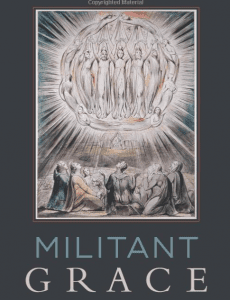 Where is the Spirit in faith? We are looking at Philip Ziegler, Militant Grace: The Apocalyptic Turn and the Future of Christian Theology. Ziegler observes where the Spirit fits in Reformed thinking generally, and then asks if that is enough:
Where is the Spirit in faith? We are looking at Philip Ziegler, Militant Grace: The Apocalyptic Turn and the Future of Christian Theology. Ziegler observes where the Spirit fits in Reformed thinking generally, and then asks if that is enough:
Within the main lines of the Reformed tradition, the work of the Spirit is typically schematized as bringing to subjective efficacy the objective reality of the word: to the external call of the gospel there corresponds, in the elect, the internal and effectual call of the Spirit. Within such a scheme, questions of human freedom and volition, as well as the issue of the degree of correlation between the external call and the internal call, become particularly neuralgic preoccupations. …
I suggest that proper appreciation of what is at stake in such a claim turns on a forthright recognition of the Spirit as the present power of God’s eschatological reign, militant to determine our reality, and thereby to secure us in faith by entrusting us without reserve to a life “in Christ.
Thus, for Ziegler Spirit and apocalypse are closely connected. He turns to 1 Cor 12:1-3:
Now concerning spiritual gifts, brothers and sisters, I do not want you to be uninformed. 2 You know that when you were pagans, you were enticed and led astray to idols that could not speak. 3 Therefore I want you to understand that no one speaking by the Spirit of God ever says “Let Jesus be cursed!” and no one can say “Jesus is Lord” except by the Holy Spirit [SMcK: I use NRSV].
He makes three observations:
First, the confession of faith in Jesus as Lord arises in an ambivalently religious world marked by willful ignorance, idolatry, and pervasive captivity to sin.
Second, on this scenario faith is evidently not a natural or Adamic possibility. … The believer is a spoil in the contest between the Spirit of God and the spirit of this world (1 Cor. 2:12), and the victory of the Spirit of God in this contest is the sole possibility for the advent of faith.
Third, what of the character and content of faith itself here? The homologia (confession) “Jesus is Lord” is one of earliest and most originary acclamations of Christian faith. … Tie confession of faith is a statement of belonging, an acknowledgment and invocation of our eschatological setting. As such, faith is also a declaration of allegiance. Cursing and confessing Jesus are not merely verbal gestures. They are, rather, something performative, “commitments of the whole life.” Faith owns the saving relationship with Christ for which the Spirit has repossessed us. To confess Jesus as Lord is therefore an act of practical recognition, in which one entrusts oneself actively and obediently to his disposition and service. Created and propelled by the Spirit, faith in the lordship of Jesus is not only an assertive declaration but always at the same time an expressive and commissive illocution. It has its home in worship, yet also in witness, and therefore also amid controversy and “despite the presence of opponents.” Christian faith is, for this reason, always a matter of polemical doxology.
Now the big one:
Paul construes salvation as redemption from under the false lordship of such powers. In so doing he displays an understanding of the nature of the Spirit’s action as simultaneously militant, eloquent, and graciously sovereign. In view of this, confession of faith in Jesus’s lordship represents an astonished human acknowledgment of the sheer gratuity of the divine victory over the gods of the passing age. In correspondence with the nature of the Spirit’s agency in this victory, the confession of faith takes shape in a self-involving act that, owning Jesus before the world, declares and praises the free gift of salvation in him.
Here’s an observation of mine about this fascinating book. While the substance of Ziegler’s claims are often very agreeable to me, I just suspect he’s smuggling in the term “apocalyptic” to connote theological alignments that are not as clearly apocalyptic in a strict sense of the term in Pauline thought. In other words, apocalyptic is at times the constructed framework, the explanatory apparatus, rather then inductively shaped conclusion. Having said that, Ziegler’s book expresses very much that I like and he does so often enough with clean, clear prose.












